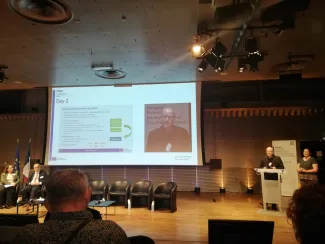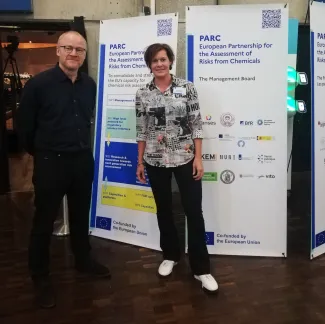Launch of the European research and innovation PARC programme to improve chemical risk assessment
The European Partnership for the Assessment of Risks from Chemicals (PARC), was launched in Paris, France, seeking to develop next-generation chemical risk assessment, incorporating both human health and the environment in a "One Health" approach. It will help support the European Union's Chemicals Strategy for Sustainability and the European Green Deal's "zero pollution" ambition. Bringing together nearly 200 partners from 28 countries as well as EU agencies, PARC is coordinated by ANSES, with funding from the European Commission's Horizon Europe research and innovation framework programme and the partnership’s participants.

Launched on 11 May 2022 under the French Presidency of the Council of the European Union, PARC aims to bring together a broad community of research establishments and health agencies to advance research, share knowledge and improve skills in chemical risk assessment. The results of this partnership will be used to support new European and national strategies to reduce exposure to hazardous chemicals and their impact on health and the environment.
The goal will be to generate new, easily accessible and usable data, along with new assessment methods and tools. In particular, PARC will help with the development of tools to identify new, less hazardous substances that are in keeping with sustainable development approaches.
PARC has strong ambitions for scientific collaboration, and will provide a unique opportunity for the different risk assessment players to work together above and beyond the schemes and timetables associated with the different sector-specific regulations. By identifying opportunities for pooling efforts at national and European level, it will optimise the resources dedicated to chemical risk assessment and monitoring, and accelerate progress in these areas.
The partnership will build on previous work, in particular the actions undertaken as part of the European Joint Programme HBM4EU (Human Biomonitoring for Europe), which will end in summer 2022. The partnership will build on previous work from different European projects and programmes, like the EURION and ASPIS clusters, EU-ToxRisk, EuroMix.
To date, PARC involves nearly 200 partners from 28 countries, as well as three EU agencies (the European Environment Agency – EEA, the European Chemicals Agency – ECHA and the European Food Safety Authority – EFSA). It is bringing into play public partners across the continent, including European and national risk assessment agencies, universities and public research organisations. Five Directorates-General of the European Commission (DG-RTD, DG-GROW, DG-ENV, DG-SANTE and JRC) and the ministries of the countries involved are contributing to the governance of PARC and will monitor its activities. Fifteen organisations in France are partners in this major project.
VITO is a partner and Management Board member in PARC and will have prominent roles in its activities concerning implementation of FAIR data principles, human biomonitoring, and integrative exposure, risk and health impact assessment. With its role in PARC, VITO further disseminates the knowledge and experience of Flanders to Europe and vice versa.
The partnership will run for seven years and is scheduled to end in spring 2029. PARC has an estimated budget of €400 million, half of which is being funded by the European Commission and the rest by the partner countries. ANSES is the partnership coordinator.

European partnership
This partnership has received funding from the European Union’s Horizon Europe research and innovation programme under Grant Agreement No 101057014.




